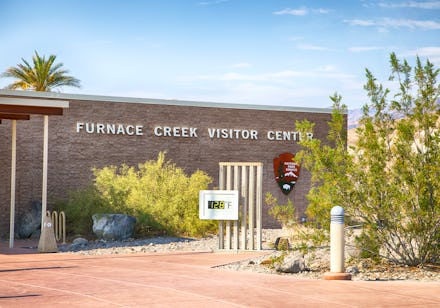Death Valley just hit the second hottest temperature ever recorded on Earth

Death Valley broke a record on July 13, when it clocked the hottest temperature on Earth since 2017 at a spicy 128 degrees Fahrenheit. One hundred and twenty eight degrees! That's 28 degrees hotter than 100, for those counting.
Recorded at Furnace Creek, the Valley's aptly named weather station, the temperature follows a number of record-breaking highs all across the United States as the nation undergoes a sweltering heatwave. The heatwave itself follows climate change trends long predicted by scientists, who warned this would happen. Multiple times.
The record is just one degree shy of Death Valley's highest temperature (129 degrees F), recorded back in 2013, which scientist think is the hottest recorded temperature on Earth. It's not completely unusual for Death Valley to hit such high temperatures — it's called 'Death Valley' for a reason — but it still marks an upward trend of temperatures across the southern states including Southern California, Arizona, New Mexico, and West Texas.
This sort of extreme heat can be life-threatening, and numbers of heat-related deaths in the U.S. have continued to rise, even tripling in some states, as officials struggle to figure out how to address it. Any hesitation to respond can result in more heat-related illnesses and deaths among the poor and elderly who sometimes have to make a choice between the cost of running the air conditioner or something just as important — like medicine.
Meanwhile, mother nature isn't waiting for mankind to get its act together. On July 10, CBS News reported that the heatwave was lasting even longer than usual. Amarillo, Texas, was experiencing its 10th day of 100+ degrees Fahrenheit weather, for example, and some places were expected to have prolonged extreme heat for multiple weeks.
"The heatwave will be very long-lived, lasting multiple weeks in some areas with only a few days of near-normal temperatures during that span," Weather Underground founder Jeff Masters told CBS News. "This will increase the odds of heat illness and heat-related deaths."
Heat-related deaths are a public health issue, a problem that the U.S. Centers for Disease Control and Prevention (CDC) is supposed to help solve, wrote The Weather Channel in June. But cuts to its programs, and pretty much anything mentioning climate change, have rendered the department too weak and neutered to handle the situation.
"The Obama administration missed opportunities to expand the program," explained The Weather Channel. "And officials under the current administration have made strides to eliminate the program altogether, leaving state and local health workers ill-equipped to face worsening climate change effects. President Trump's 2020 budget proposal took an ax to the CDC, and included a proposal to eliminate the Climate and Health Program entirely."
Scientists and other environmental experts have pointed to climate change as the cause of the rise in temperatures, the lengthening of heat seasons, and the increasing intensity of other extreme weather events such as hurricanes. They've stressed over and over that it's not too late to change our course and undo some of the damage our dependency on fossil fuels has caused.
And as the U.S. continues to look the other way, officials in other parts of the world are contemplating whether they can take advantage of the virus-induced lockdowns to switch gears toward a greener future. So at least there's still some hope that someone will lead the charge in changing the world's consumption and production habits for the better.